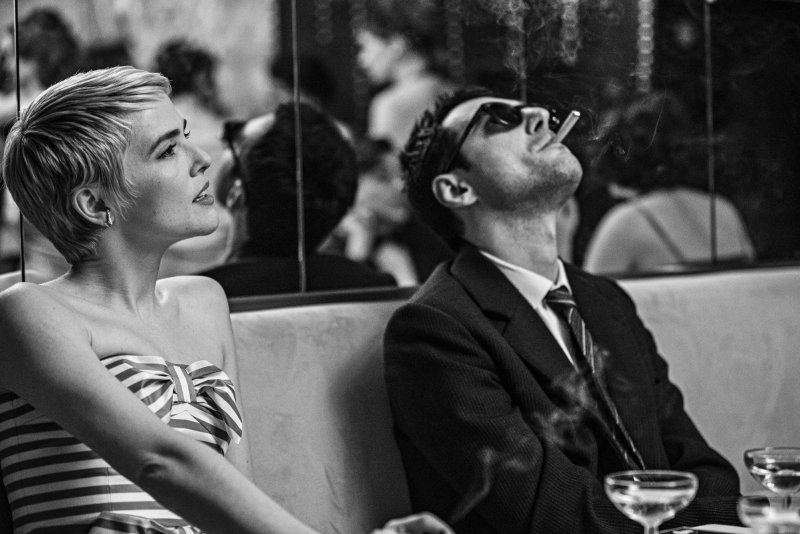Entertainment
Nouvelle Vague Celebrates Godard’s Cinematic Rebellion

The film Nouvelle Vague, now showing in theatres and available on Netflix starting November 17, 2023, offers a vibrant homage to the revolutionary spirit of French director Jean-Luc Godard. Starring Guillaume Marbeck as Godard, the film explores his early career in 1959 France, where he, along with contemporaries like Francois Truffaut and Claude Chabrol, sought to redefine the boundaries of cinema.
Godard’s journey as a filmmaker begins with his groundbreaking debut, Breathless, which he crafted to challenge traditional storytelling norms. The film, released in 1960, centers around a criminal on the run, yet it strays from conventional narrative structures by focusing on the characters’ spontaneous dialogues rather than a straightforward plot. Godard’s radical approach not only transformed filmmaking but also highlighted his disdain for the mechanical nature of scripted performances. He often chose to film without sound, allowing for improvisation and real-time direction during takes. This unconventional method posed considerable challenges for his lead actors, particularly Jean Seberg, played by Zoey Deutch, who preferred more structured preparations.
In Nouvelle Vague, director Richard Linklater emulates Godard’s unique style through the film’s black-and-white visuals and aspect ratio, effectively capturing the essence of the French New Wave. The narrative showcases Godard’s anarchic approach to filmmaking, wherein he often disregarded continuity and left financiers frustrated by his sporadic shooting schedules. The film cleverly dramatizes behind-the-scenes moments, including how Godard instructed editors to abandon their traditional training in favor of his avant-garde vision.
The film also features a range of notable figures from French cinema, identified through on-screen text in a manner reminiscent of Godard’s own work. Characters frequently address the camera directly, reflecting Godard’s penchant for breaking the fourth wall. Through these stylistic choices, Nouvelle Vague not only pays tribute to Godard’s cinematic innovations but also provides a glimpse into the rebellious spirit of the era.
Linklater’s own career, marked by films such as Slacker and Dazed and Confused, resonates with Godard’s ethos of exploring character-driven narratives. His understanding of independent filmmaking allows him to convey the joy and audacity inherent in Godard’s work, making Nouvelle Vague accessible to contemporary audiences.
Fans of Breathless may find intrigue in Nouvelle Vague, which serves as both a historical insight and a celebration of Godard’s legacy. For those looking to delve further into Godard’s oeuvre, Weekend, released in 1967, offers an even more radical departure from conventional cinema, showcasing his evolution as a filmmaker.
In essence, Nouvelle Vague stands as a captivating exploration of a cinematic pioneer, inviting viewers to appreciate the rebellious spirit that has shaped modern filmmaking. Through Linklater’s engaging direction and Marbeck’s portrayal, the film encapsulates the essence of Godard’s legacy and the enduring influence of the French New Wave.
-

 Top Stories3 weeks ago
Top Stories3 weeks agoMarc Buoniconti’s Legacy: 40 Years Later, Lives Transformed
-

 Business2 weeks ago
Business2 weeks agoForeign Inflows into Japan Stocks Surge to ¥1.34 Trillion
-

 Health3 weeks ago
Health3 weeks agoInnovative Surgery Restores Confidence for Breast Cancer Patients
-

 Sports1 month ago
Sports1 month agoSteve Kerr Supports Jonathan Kuminga After Ejection in Preseason Game
-

 Top Stories3 weeks ago
Top Stories3 weeks agoBOYNEXTDOOR’s Jaehyun Faces Backlash Amid BTS-TWICE Controversy
-

 Science1 month ago
Science1 month agoChicago’s Viral ‘Rat Hole’ Likely Created by Squirrel, Study Reveals
-

 Lifestyle1 month ago
Lifestyle1 month agoKelsea Ballerini Launches ‘Burn the Baggage’ Candle with Ranger Station
-

 Entertainment1 month ago
Entertainment1 month agoZoe Saldana Advocates for James Cameron’s Avatar Documentary
-

 Science2 weeks ago
Science2 weeks agoUniversity of Hawaiʻi Joins $25.6M AI Project to Monitor Disasters
-

 Politics1 month ago
Politics1 month agoDallin H. Oaks Assumes Leadership of Latter-day Saints Church
-

 Lifestyle1 month ago
Lifestyle1 month agoDua Lipa Celebrates Passing GCSE Spanish During World Tour
-

 Business1 month ago
Business1 month agoTyler Technologies Set to Reveal Q3 2025 Earnings on October 22









